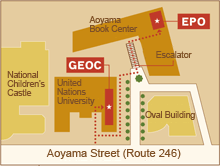Summary
【Objectives of the Field Mustard Land Revival Project】
“Through utilizing disaster-affected farmland, deserted arable land, etc., and by cultivating field mustard plants in cooperation with area residents, while resolving regional issues, {we} strive for the goals of ‘local production and consumption of food & energy’ and ‘a recycling-oriented region’ ”
Along the seacoast of Iwate Prefecture, farmland in an area stretching 700 km from north to south was damaged due to the multiple tsunami which followed the Great East Japan Earthquake of March 11, 2011. When including salt damage, the affected farmland area surpassed 700 hectares. Because soil was washed away, dirty water accumulated in rice paddies, rubble was scattered around, and farm equipment was lost, many farmers could not continue in their professions. Seeing the dire situation, rather than just waiting for governmental measures, this project was begun with the aim of helping – even if only in minor ways – the farmers recover.
Field mustard plants are special – not only are they pretty in appearance, but also the flowers can be eaten, and rapeseed oil (“canola oil” in North America) can be extracted from the seeds. In addition, the oil can be refined into fuel for diesel vehicles. With the plants seen as a symbol for a “recycling-oriented region”, an objective is for ‘nanohana’ to serve as an impetus for broadly raising the consciousness of people in regards to energy and food, and to stimulate thinking about lifestyles in harmony with nature. Field mustard plants can become food in an emergency, or turned into electricity or fuel for vehicles; they are useful for producing biomass-originated renewable energy.
A characteristic of rapeseeds is that they absorb salt more readily that do other plants. That, combined with the fact that as the plant’s roots grow, they can soften up the soil, shows that soil can be improved through their cultivation. Therefore, using these plants – not only on farmland hit by tsunami, but also in flowerbeds along roads, and on wasteland – participants are working to remove as much salt as possible, to clean up the affected soil.
The activities are also being carried out by area residents and volunteers visiting from outside the area. Therefore, interaction takes place between people from inside and outside the affected region; this creates opportunities for visitors to come in contact with the disaster-affected area, and for everyone involved to think about issues concerning the aging/depopulation of communities.
The rapeseed oil extracted from the 2012 harvest was sold as “Yuikko” cooking oil. It entailed oil extraction like that of the old days – organic, additive-free, without the use of chemical fertilizer – with a strong focus on quality, and maintaining the natural taste and aroma. The work of attaching labels becomes an income source for residents of disaster-hit areas, and the revenue earned goes towards community businesses in the affected region, and also gets passed on to residents. Thus the project is of benefit to the local communities, in accordance with their current needs.
Points about the partnership
Aiming to be communities through which energy, resources, etc. are circulated (recycled), and where a full spectrum of activities are carried out – including support for disaster-hit areas, agriculture, production of commercial goods, etc.
In the future, the idea of people in affected cities taking the lead in the activities carried out in their own cities is being taken into consideration.
Currently, old Japanese-style houses in the area are being renovated into ‘eco-houses’ (tentative name) which are to be 100% self-sufficient in terms of energy usage. Preparations are ongoing to design them as lodging facilities which also serve as locations where local residents and visitors can gather and learn together.
[Volunteers]
In total, over 2,000 people (including residents of disaster-hit areas and volunteers) have been involved.
Category
□Project cooperation/project accord
Theme
Prevention of climate change/energy-related, ESD/environmental education, Waste/’3R’principles, Social business/CSR, Town/City planning
Actor
nanohana daichi-fukko project (the Field Mustard Land Revival Project)
– United Green (a general incorporated association)
Partner
The Rapeseed {Field Mustard} Project for Restoring Tsunami-Salt-Damaged Farmland
– Graduate School of Agricultural Science, Tohoku University
Tahara Nanohana Eco-network (an incorporated NPO)
Ainomachi Eco-club (an incorporated NPO)
ECOERC Co., Ltd.
SENDA CLEAN, Ltd.
Local residents
Volunteers from around the nation
Reference
United Green (general incorporated association)
http://unitedgreen.jp
“The Field Mustard Land Revival Project”
http://nanohana.unitedgreen.jp/
Bio-diesel Adventure(BDA)
A project not dependent on fossil fuels, it involves driving around the world while refining used cooking oil into bio-diesel fuel
http://biodieseladventure.com

















